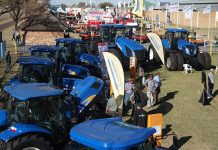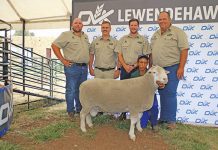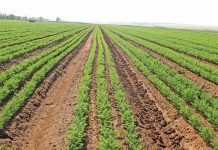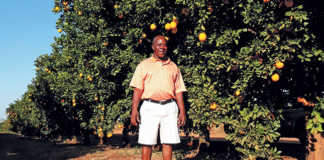Settlers Agricultural High School near Bela-Bela, Limpopo, was founded in 1969 by a group of farmers from Springbok flats in the former Transvaal.
This support continued for many years and local farmers played a crucial role in developing the farm on the school property. The institution – the only English-medium agricultural school in the then southern Transvaal – gained a reputation as one of the best of its kind.
Today, sadly, support from farmers, government and agri-businesses has faded, and the results are clear: the infrastructure is dilapidated and facilities in the dairy – one of the sections that keeps the farm going – are out of date.
According to the principal, Gerhard Viljoen, Settlers has changed from being an agriculture-focused school to an ordinary high school with boarding. Learners attend the school simply because it offers boarding facilities, not because of its agricultural subjects.
Gerhard explains that the challenge these days is merely trying to keep the school functioning. “Because of this, we have to make sure we run the accommodation as a business unit,” he says.
This means, however, that costs are rising, in turn making it difficult for learners who are keen on agriculture, especially those from the rural areas. “They find it hard to afford the fees,” says Gerhard.
“Previously, the hostels were subsidised by the government.” Today, however, there is no subsidy, despite the fact that hostels are an integral part of an agricultural school as pupils have to do practical work after normal lessons.
“We need to focus on a new drive to turn the school back into an institution focused on agriculture,” he argues.
Revamping the farm
Despite the difficulties, Settlers has tried to keep up certain farming activities. It operates a dairy factory where cheese and yoghurt is manufactured, and keeps a number of layers, about 70 mixed-breed goats, 40 dairy cows and more than 50 beef cattle. It also works on a crop-sharing basis with a neighbouring farmer.
“We take 20% of the yield,” Gerhard says. “We plant sunflower on the land and market it at NTK.”
A centre pivot, according to Gerhard, would help increase output and profitability. But this of course would cost money.
He adds that the school needs at least R1 million to repair and upgrade its infrastructure, some of which is 40 years old. “We also need to upgrade our tractors. They are all about 30 to 40 years old,” he says. “We ideally need a manufacturer to lend us tractors and other equipment.
“Trying to teach learners about precision farming when you have 30-year-old equipment is a problem,” he jokes wryly.
Back to basics
Gerhard’s goal is straightforward: to return the school to being an agriculture-focused institution. At the moment, Settlers offers pupils agricultural science, agricultural technology and agricultural management as subjects.
“We want to make it compulsory for learners to register for agricultural subjects from grades 10 to 12,” says Gerhard. “Because we don’t offer these subjects in grades 8 and 9, we would then introduce agricultural topics in subjects such as technology and natural science.
“Our enrolment for next year will be strictly for learners who want to do agriculture.” The school has set up a task team to help it in its drive to refocus on agriculture. It consists of selected members of the teaching staff, parents, and representatives of DAFF, the Limpopo Department of Agriculture and agri-businesses, and aims to assist with fund-raising and lobbying for support.
“We invited the Department of Basic Education, but it didn’t pitch,” Gerhard recalls. However, the department has offered technicians and subject specialists to teach practical courses at the school in the afternoons.
“We would also like agri-businesses to make bursaries available for pupils,” he adds. “These youngsters would then work for the companies after their schooling, or possibly be sponsored to study at college or university. This would be a tax-deductable expense and would also help the companies with their BEE scorecards.”
Big farmers would be encouraged to sponsor children of their farm workers in a similar way. Gerhard adds that they would prefer enrolling learners from grade 8 to make sure there was time to improve their English, as English is not the first language of most of the learners.
“Taking them at grade eight will give the school a chance to sort out the language problem before they get to grade 12,” he explains.
Lack of leadership
Gerhard says that although they have a good relationship with neighbouring farmers, support for the school is limited. This is because the situation at Settlers is unique. “In most cases elsewhere, farmers send their children to the same agricultural schools they attended, and offer all kinds of support,” he says.
In the case of Settlers, the pupils’ parents are not farmers, so support and sponsorships are not forthcoming. But Gerhard insists that he does not want handouts. There are opportunities to build a mutually beneficial support system. “We would like to get into partnerships. We say, ‘Help us here and we will help you there’.” This would in the form of providing promotional opportunities to agri-businesses.
The money spent would benefit these companies in two ways: it would buy short-term marketing exposure, but far more importantly, it would strengthen the entire industry by helping to train the emerging farmers of tomorrow. Seen in this light, Settlers could well have a greater role to play than ever, and certainly deserves all the support it can get.
Contact Settlers Agricultural High School on 014 001 7023, email [email protected], or visit www.settlers.co.za
Caption:
Established in 1969, Settlers was the seventh agricultural high school in the then southern Transvaal, and the only English-medium school of its type.
PETER MASHALA












